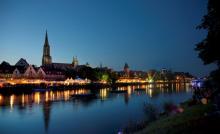
Due to the dynamic pandemic situation in autumn 2021,
the European Danube Academy and her partners were forced to postpone the conference to spring 2022.
Due to the significant escalation of the covid pandemic situation,
it would have been impossible to realize the ambition of a networking and interactive conference.
Against this background, we have decided to hold the conference in spring 2022.
We will inform you about the new date and the programme
as soon as possible. Please follow the website www.danubeculture.eu
Eight years ago, the Ministry of Science, Research and Arts Baden-Württemberg, in cooperation with the European Danube Academy, launched the International Danube Conference on Culture (DCC) series to intensify the cultural-political dialogue and to establish international networks of representatives of the cultural scene in the Danube region.
The main objective of these annual forums is to look at the Danube region as a unique but extremely diverse cultural area and to offer a platform for exchange that creates new collaborations among artists, cultural institutions and decision-makers. The conferences have become a well-known platform for presenting interesting projects, discussing cultural-political issues and promoting our region’s chances of great cultural diversity and creativity through transnational cooperation. The conference was first organised in Ulm in 2013, and returns now after Novi Sad, Timişoara, Ruse, Pécs, Linz, Regensburg and the Schallaburg to Ulm.
Under the motto „Pathway to new prosperity”, the organisers would like to discuss the possibilities of a restart for the cultural sector in the Danube region focusing on innovation, finances and sustainability.
The 9th International DCC in Ulm will take place from 21-23 November 2021.
You can find all further details regarding the programme, the online registration and the venues on the website of the Danube Conference on Culture: https://danubeculture.eu/
Photo: (c) Stadtarchiv Ulm/Europäische Donau-Akademie Ulm


